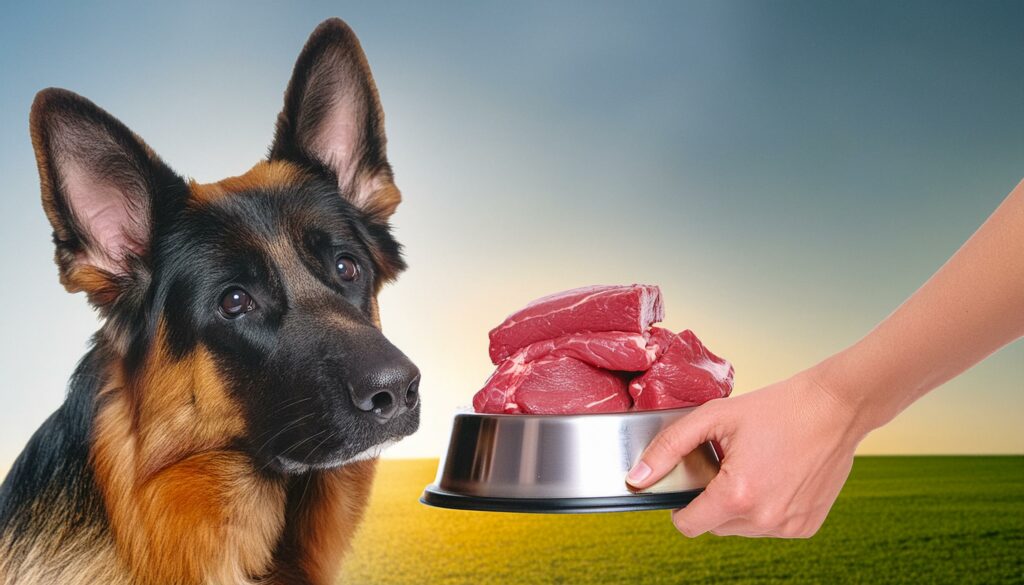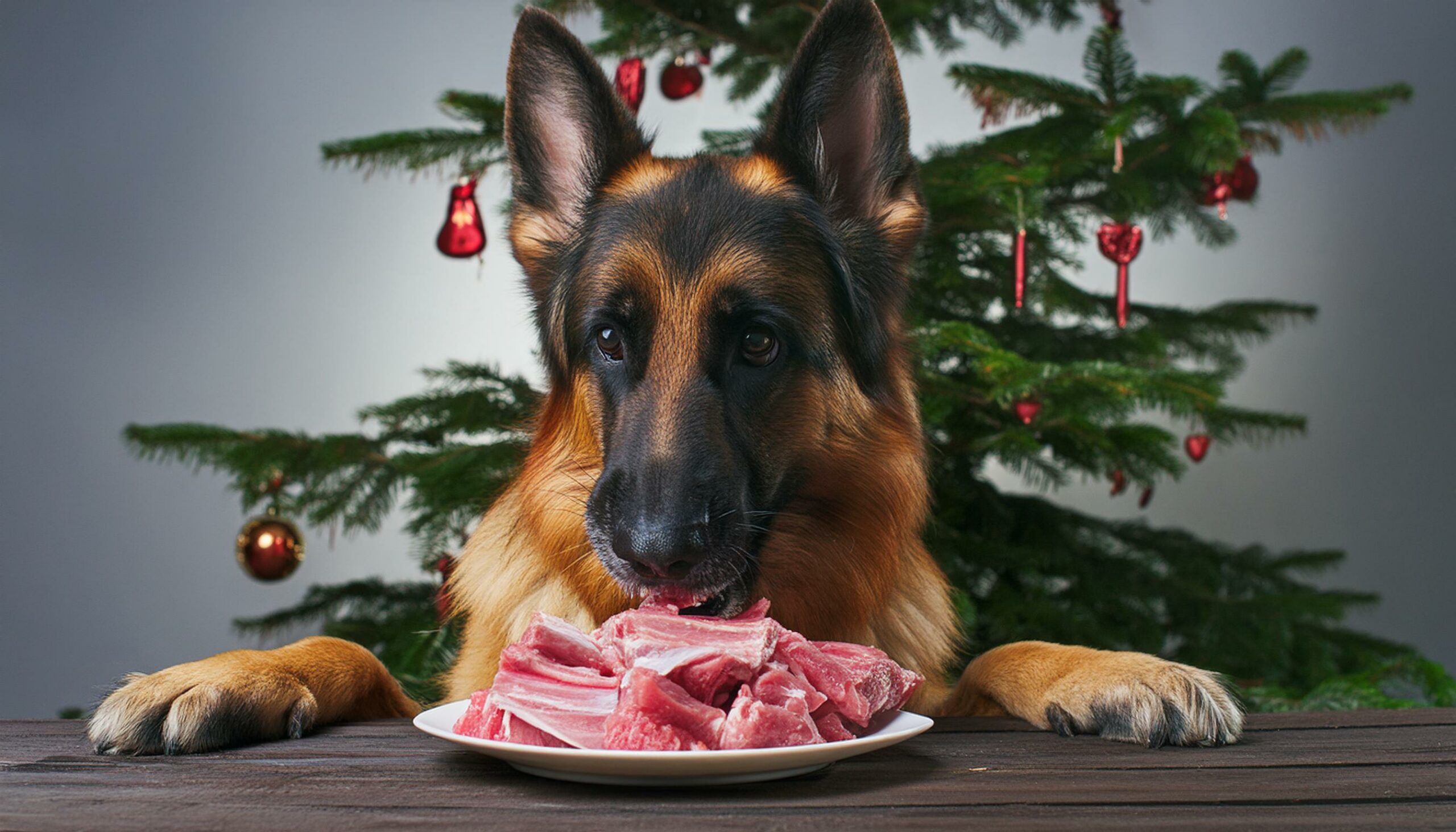German Shepherds are esteemed for their intelligence, loyalty, and versatility, but maintaining their health requires attention to their dietary needs. Among the questions that arise for German Shepherd owners is whether it’s suitable to incorporate meat into their diet. This article aims to explore this topic comprehensively, providing insights into the benefits, risks, and best practices associated with feeding meat to German Shepherds.
Nutritional Needs of German Shepherds
German Shepherds have specific dietary requirements to support their physical activity and overall well-being. They necessitate a diet rich in protein for muscle development and repair, adequate fats for energy, and a balanced array of vitamins and minerals to sustain optimal health.
Meat in a German Shepherd’s Diet
Benefits of Meat for German Shepherds
Meat stands as a valuable source of protein for German Shepherds, facilitating muscle growth, repair, and overall strength. Additionally, meat offers essential nutrients like iron, zinc, and B vitamins, vital for various bodily functions and immune support.
Types of Meat Suitable for German Shepherds
When considering meat for a German Shepherd’s diet, opt for lean, high-quality cuts to avoid excessive fat intake. Chicken, turkey, beef, and lamb are among the suitable options, providing a well-rounded nutritional profile.
Quantity of Meat to Feed
The amount of meat to offer your German Shepherd hinges on factors like age, weight, activity level, and health status. As a general guideline, meat should constitute approximately 25-30% of their daily caloric intake, with adjustments made as necessary based on individual requirements.
Potential Risks and Concerns

Despite its benefits, incorporating meat into a German Shepherd’s diet entails certain risks and considerations.
Allergies
Some German Shepherds may exhibit sensitivities or allergies to specific types of meat, leading to adverse reactions such as itching, gastrointestinal disturbances, or skin issues. It’s essential to monitor your dog closely when introducing new foods and seek veterinary guidance if any concerns arise.
Raw vs. Cooked Meat
The debate over feeding raw versus cooked meat to dogs persists. While raw meat may offer certain enzymatic benefits, it also carries a higher risk of bacterial contamination, potentially leading to foodborne illnesses. Cooking meat thoroughly mitigates this risk, ensuring safer consumption.
Bones and Choking Hazards
Feeding bones, particularly cooked ones, to German Shepherds poses risks of choking, gastrointestinal obstruction, or dental fractures. Opt for boneless meat or specially designed raw bones to minimize these hazards.
Preparing Meat for a German Shepherd
Safe and proper preparation of meat is crucial to ensure your German Shepherd’s well-being.
Cooking Methods
Utilize cooking methods like grilling, baking, or boiling to cook meat thoroughly and eliminate harmful bacteria and parasites. Ensure meat reaches appropriate internal temperatures for safe consumption.
Seasonings and Additives to Avoid
Avoid seasoning meat with ingredients like garlic, onions, salt, or spices, as these can be toxic or irritating to dogs’ digestive systems. Stick to plain, unseasoned meat to minimize the risk of adverse reactions.
Transitioning to a Meat Diet

Transitioning your German Shepherd to a meat-based diet requires careful planning and monitoring.
Gradual Introduction
Introduce meat gradually into your dog’s diet, mixing small portions with their regular food and gradually increasing the proportion over time. This gradual transition allows for proper digestion and minimizes the risk of gastrointestinal upset.
Monitoring for Adverse Reactions
Observe your German Shepherd closely for any signs of intolerance or allergy as you introduce meat into their diet. If you notice any concerning symptoms, consult your veterinarian promptly for further evaluation and guidance.
Balancing Meat with Other Foods
While meat is an essential component of a German Shepherd’s diet, it should be supplemented with other food groups for nutritional balance.
Incorporating Fruits and Vegetables
Incorporate a variety of fruits and vegetables into your German Shepherd’s meals to provide essential vitamins, minerals, and antioxidants. Fruits like apples, berries, and vegetables like carrots, spinach offer valuable nutrients and dietary fiber.
Commercial Dog Food Options
Consider supplementing your German Shepherd’s diet with high-quality commercial dog food to ensure a well-rounded nutritional intake. Look for formulations tailored to their specific needs, taking into account factors like age, activity level, and health status.
Consulting with a Veterinarian
Before implementing any significant dietary changes for your German Shepherd, consult with your veterinarian.
Importance of Professional Advice
Veterinary guidance is invaluable in crafting a diet plan tailored to your dog’s individual needs and health status. Your veterinarian can offer personalized recommendations, address any concerns, and ensure your German Shepherd’s dietary requirements are adequately met.
Tailoring Diet to Individual Dog’s Needs
Every dog is unique, with varying dietary preferences, sensitivities, and health considerations. Work closely with your veterinarian to develop a diet plan that aligns with your German Shepherd’s specific requirements, promoting optimal health and well-being.
Conclusion
In conclusion, incorporating meat into your German Shepherd’s diet can be a beneficial practice when done thoughtfully and safely. By selecting high-quality meats, preparing them properly, and balancing them with other food groups, you can provide your dog with essential nutrients to thrive. However, it’s essential to be mindful of potential risks, monitor for adverse reactions, and seek professional veterinary guidance when needed to ensure your German Shepherd’s nutritional needs are met effectively.
FAQs
Is it safe to feed my German Shepherd raw meat?
While some proponents advocate for raw feeding, raw meat poses risks of bacterial contamination. Consult with your veterinarian to weigh the potential benefits and risks for your dog.
Can I give my German Shepherd bones to chew on?
It’s safer to avoid feeding cooked bones, as they can splinter and pose choking hazards or gastrointestinal obstructions. Opt for specially designed raw bones or boneless meat options instead.
What if my German Shepherd is allergic to certain types of meat?
If your dog exhibits signs of food allergies or intolerances, such as itching or digestive disturbances, consult with your veterinarian to identify the allergen and adjust their diet accordingly.
How do I know if my German Shepherd is getting enough protein in their diet?
Your veterinarian can assess your dog’s dietary needs and recommend an appropriate protein intake based on factors like age, weight, activity level, and health status.
Can I mix homemade meat-based meals with commercial dog food?
Yes, mixing homemade meals with commercial dog food can offer dietary variety and balance. Choose high-quality commercial options that complement the nutrients provided by homemade meals.
